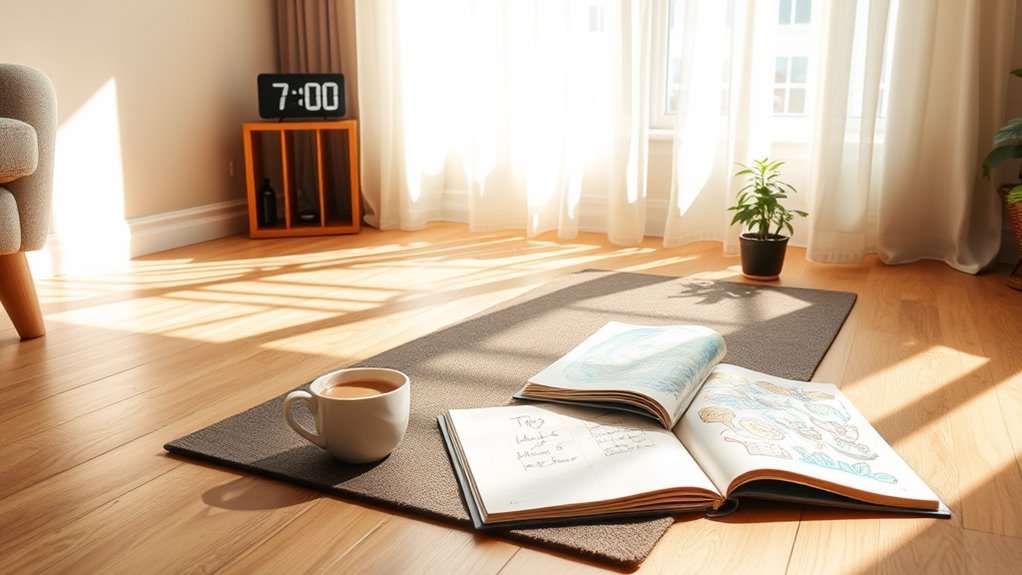The 5-Minute Night Routine That Will Improve Your Sleep Quality
To improve your sleep quality in just five minutes, start by creating a calm sleep environment: dim the lights and use blackout curtains. Next, limit screen time by turning off devices an hour before bed. Incorporate relaxation techniques like deep breathing or gentle stretching. Spend a moment writing down your thoughts to clear your mind. Finally, focus on setting a consistent sleep schedule to regulate your body’s internal clock. There’s more to discover for a better night’s rest.
Key Takeaways
- Dim the lights and eliminate screen time to signal your body it’s time to wind down.
- Engage in deep breathing exercises to calm your nervous system and reduce stress.
- Spend a few minutes stretching or practicing progressive muscle relaxation for physical release.
- Create a soothing environment with blackout curtains and calming scents like lavender.
- Establish a consistent bedtime and wake-up time to regulate your internal clock.
The Importance of a Night Routine
Creating a consistent night routine is crucial if you want to improve your sleep quality. A well-structured routine signals your body that it’s time to wind down, making it easier to shift into restful sleep.
By incorporating deliberate activities like reading or meditating, you can enhance your mental clarity, preparing your mind for better sleep. Establishing this routine also helps regulate your internal clock, optimizing your body’s natural rhythms. Implementing simple nighttime rituals can further enhance your sleep experience and promote relaxation.
You’ll find that as you commit to this practice, sleep becomes deeper and more restorative. Mastering your night routine empowers you to take control of your sleep environment and overall well-being.
Step 1: Create a Sleep-Inducing Environment
A calming atmosphere is essential for promoting restful sleep, so start by transforming your bedroom into a serene sanctuary.
Dim the lights to signal your body that it’s time to wind down. Consider using blackout curtains to block out any disruptive light and create a cozy ambiance.
Keep your room cool; a temperature between 60-67°F (15-19°C) is ideal for sleep. Declutter your space, as a tidy environment fosters relaxation.
Incorporate soothing scents like lavender with essential oils or candles to enhance tranquility. This aligns with the essential components that help prepare your mind and body for sleep.
Finally, invest in comfortable bedding; quality sheets and pillows can make a significant difference.
Step 2: Limit Screen Time
To get better sleep, you need to limit your screen time before bed.
The blue light from devices can disrupt your natural sleep cycle, making it harder to fall asleep.
Instead, consider alternative evening activities like reading or gentle stretching to wind down. Engaging in these activities can help enhance your sleep quality and promote relaxation before bedtime.
Blue Light Effects
Limiting screen time before bed is essential for minimizing the effects of blue light on your sleep. Blue light, emitted by devices like smartphones and tablets, can disrupt your circadian rhythm, making it harder to fall asleep. It suppresses melatonin production, the hormone responsible for regulating sleep.
To master your nighttime routine, aim to turn off screens at least an hour before bed. Instead of scrolling through social media, consider engaging in calming activities that don’t involve screens. This simple adjustment can greatly enhance your sleep quality. Additionally, incorporating calming activities such as reading or gentle stretching can further promote relaxation and prepare your body for rest.
Alternative Evening Activities
What can you do instead of scrolling through your phone at night? Consider diving into a good book. Reading not only relaxes your mind but also enhances your focus and creativity.
Alternatively, engage in light stretching or yoga. These gentle movements ease tension and prepare your body for rest.
Journaling is another powerful option; jotting down thoughts helps clear your mind and reflect on your day.
You might also try meditative practices like deep breathing or mindfulness. These activities center your thoughts and promote emotional well-being.
Finally, enjoy some calming herbal tea, which can further signal your body that it’s time to wind down. Incorporating a simple evening routine can significantly enhance relaxation and improve your overall sleep quality.
Replace screen time with these enriching habits to cultivate a more restorative evening routine.
Step 3: Practice Relaxation Techniques
As you wind down for the night, practicing relaxation techniques can greatly enhance your ability to fall asleep peacefully.
Start by focusing on your breath; take deep, slow inhales followed by gentle exhales. This simple method calms your nervous system and reduces stress.
You can also try progressive muscle relaxation, where you tense and then release each muscle group, promoting a sense of release throughout your body.
Visualization is another powerful tool; picture a serene landscape or a calming scene that brings you joy.
Finally, consider incorporating gentle stretches or soothing sounds, like soft music or nature sounds.
Step 4: Write Down Your Thoughts
To clear your mind and prepare for a restful night, jotting down your thoughts can be incredibly beneficial. This simple act helps release mental clutter, allowing you to unwind and focus on sleep.
Here are some ideas to reflect upon when writing:
-
Daily reflections: Note what went well and what you learned today.
-
Gratitude list: Write down three things you’re grateful for to foster positivity.
-
To-do items: List tasks for tomorrow to prevent them from lingering in your mind.
-
Feelings check-in: Capture your emotions to understand and process them better.
Step 5: Set a Consistent Sleep Schedule
Once you’ve cleared your mind with some reflective writing, establishing a consistent sleep schedule can greatly enhance your sleep quality.
Aim to go to bed and wake up at the same time every day, even on weekends. This helps regulate your body’s internal clock, making it easier to fall asleep and wake up refreshed.
You’ll find that consistency reinforces your sleep-wake cycle, leading to deeper, more restorative sleep.
Avoid late-night screen time and create a calming pre-sleep ritual to signal your body that it’s time to wind down.
By committing to this routine, you’ll not only improve your sleep quality but also enhance your overall well-being and daily performance.
Mastering your sleep schedule is a powerful tool for ideal health.
Bonus Tips for Better Sleep Quality
While establishing a consistent sleep schedule is essential, there are additional strategies you can implement to further enhance your sleep quality.
Mastering these tips can elevate your nightly rest and boost your overall well-being:
-
Limit screen time: Reduce exposure to blue light at least an hour before bed to promote melatonin production.
-
Create a sleep sanctuary****: Keep your bedroom dark, cool, and quiet to foster a restful environment.
-
Practice relaxation techniques****: Incorporate deep breathing, meditation, or gentle yoga into your routine to calm your mind.
-
Be mindful of your diet: Avoid heavy meals, caffeine, and alcohol close to bedtime, as these can disrupt sleep.
Frequently Asked Questions
How Long Does It Take to See Improvements in Sleep Quality?
You’ll typically notice improvements in sleep quality within a few days to a couple of weeks. Consistency’s key; as you establish better habits, your body adapts, leading to deeper, more restorative sleep over time.
Can I Adjust This Routine for Different Sleep Schedules?
You can tweak the routine for different sleep schedules. Just adjust the timing and activities to fit your needs. With a little effort, you’ll transform your nights into a sleep sanctuary like never before!
What if I Struggle With Relaxation Techniques?
If you struggle with relaxation techniques, try different methods. Experiment with deep breathing, progressive muscle relaxation, or guided imagery. Find what resonates with you, and practice consistently to build mastery and enhance your overall relaxation.
Are There Specific Herbs or Teas That Help With Sleep?
When the moon whispers secrets of rest, you might find solace in chamomile or valerian root. Try sipping lavender tea or passionflower infusion; they’re known to cradle you gently into a peaceful slumber.
How Do I Handle Sleep Disruptions During the Night?
When you experience sleep disruptions, stay calm. Focus on your breathing, visualize a peaceful scene, or gently stretch. Avoid checking your phone; instead, embrace the quiet and allow yourself to drift back to sleep.





